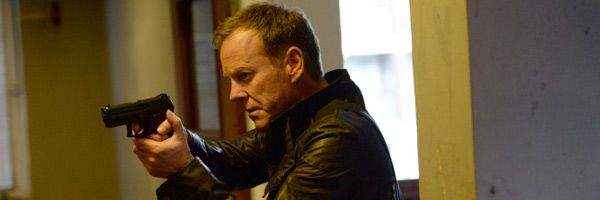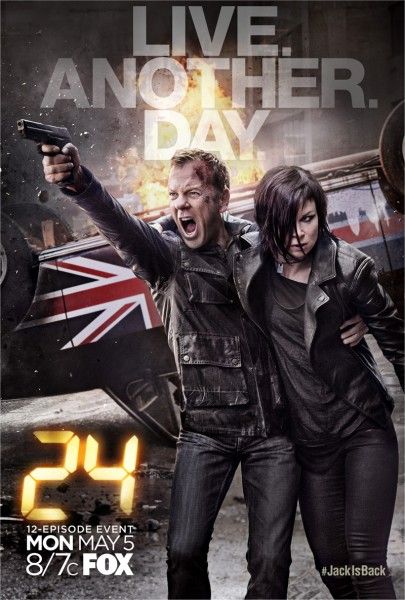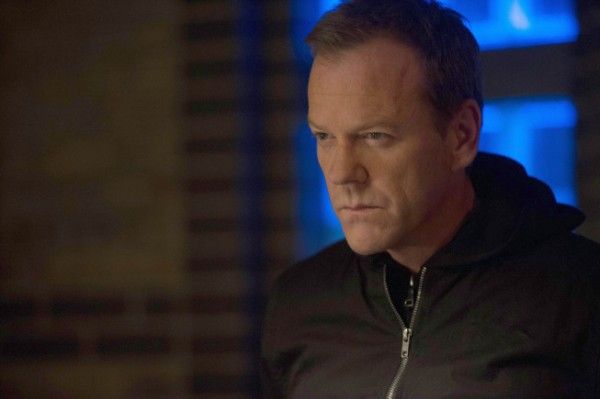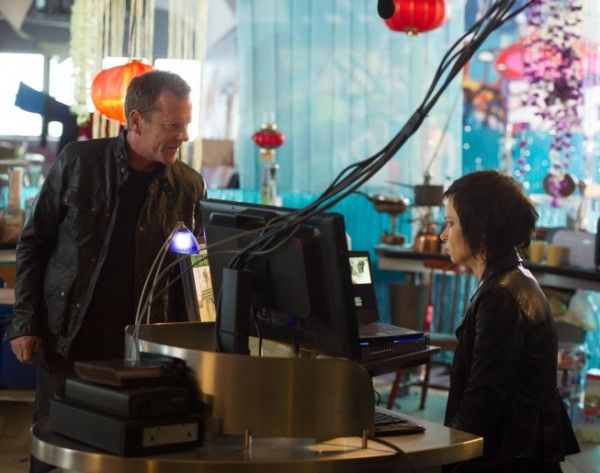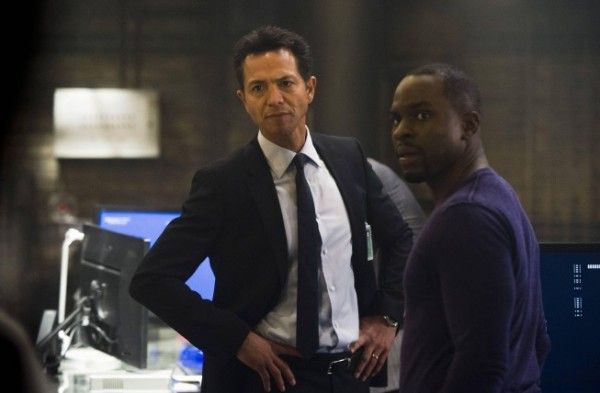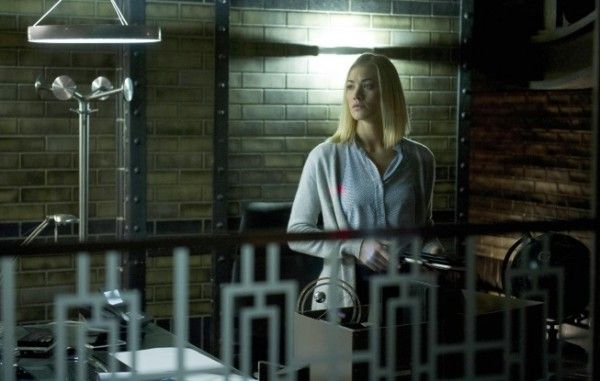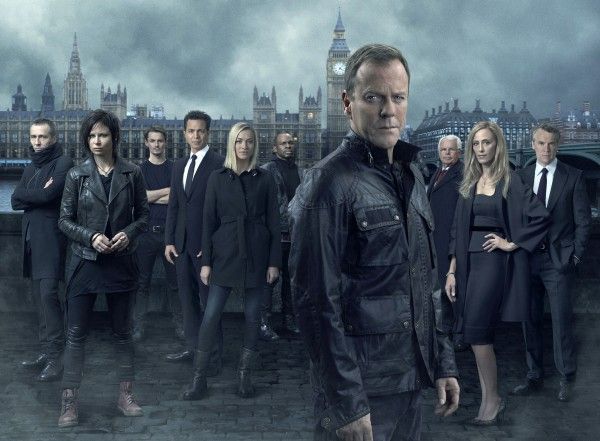24: Live Another Day resets the ticking clock for a groundbreaking and thrilling new event series, premiering on Fox on May 5th. Set and shot in London, heroic agent Jack Bauer (Kiefer Sutherland) is back, but not a fugitive from justice. Willing to risk his life and freedom to avert yet another global disaster, Jack needs the help of his old CTU confidante Chloe O’Brian (Mary Lynn Rajskub), if he’s going to keep CIA head Steve Navarro (Benjamin Bratt) and CIA agent Kate Morgan (Yvonne Strahovski) off his trail. The show also stars William Devane, Kim Raver, Tate Donovan, Giles Matthey, Gbenga Akinnagbe, Michael Wincott, Stephen Fry and Michelle Fairley.
During this recent interview to promote the premiere of this event series, actor/executive producer Kiefer Sutherland talked about how often people used to ask him about whether 24 would ever come back, why Jack Bauer is so relatable, what he loves about this character and the idea of the show, his process for jumping back into this character’s skin, who Jack Bauer is now, how different this 24 event series is from what the movie would have been, whether he would consider doing another 12-episode season, and what he would like the legacy of 24 to be. Check out what he had to say after the jump.
Question: Over the years, how many times have fans asked you, “When is 24 coming back”? Were you ever in some odd places where you couldn’t believe they knew about Jack Bauer?
KIEFER SUTHERLAND: Well, I got it a lot. And it wasn’t just a question of whether or not 24 was coming back, but it was more specific towards when because people were anticipating a movie. And then, with regards to where, that’s always amazed me. Even in the context of the promotion of another television show I did, called Touch, where I would be in Russia or South Africa, I was always amazed at how successful the show was and that it somehow managed to transcend culture, language, politics, religion, etc. I’ve never had another project that I’ve been a part of that has had that kind of international success, where arguably through Europe, Asia, and even parts of Africa, it was equally as successful as it was in America. I think that is a really rare thing for an American television show. It’s also something I’m quite proud of. And then, with regards to people coming up, it was either one of two things. They would either say, “Oh, man, I really miss 24,” or they would ask about a film. The last thing that I thought we were going to do is another season, and I think fans were surprised by that, as well, hopefully in a good way.
What is it about the character that you think thrills people so much?
SUTHERLAND: I think Jack Bauer is hugely relatable. Obviously, the circumstances are massively exaggerated, but I think all of us, on some level, feel a connection to a character like Jack Bauer because this is a guy who’s facing insurmountable odds, and yet he goes into the fight, regardless. Life makes us feel like that, too. Life is tricky. And then, there’s the fact that he doesn’t always win. In the context of the first season, he managed to save the president and he managed to get his daughter back, but he lost his wife. A guy goes and gets a promotion at work and he’s very happy for a few minutes, but then realizes that he doesn’t have time to take his son to football practice anymore. I think there’s a reality in that not winning that makes Jack Bauer incredibly relatable. And after 9/11, there was a real feeling of helplessness, and I think Jack Bauer, as a character, was dogmatic and, regardless of the circumstances, was going to push forward. I certainly found that comforting. I certainly felt very helpless after 9/11, and there was great refuge for me in that character.
What is it about this character that makes you so willing to keep coming back for more?
SUTHERLAND: Well, I love the character and I love the idea of the show. When we started this show, the real star was the time signature. In the context of a thriller, which is the genre that this show falls in for me, that ticking clock really does matter. It makes you quite nervous, inherently, because you know time is running out. So, for all of those reasons, I found it fascinating. I also think Jon Cassar, as a director, shoots this in a way that is just intoxicating. And thrillers are a genre of movies that I most like watching. I liked them growing up. Take a look at films like The Bourne Identity. This fits right into that category. So, it’s not only something where I think there is a great opportunity to do something really special, but it’s also what I personally like. I find the dynamic of this kind of a show to be fascinating and interesting, and something that I feel I understand. And so, for all of those reasons, 24 is a really attractive thing for me to do.
What was your process for jumping back into the skin of Jack Bauer?
SUTHERLAND: Well, my first instinct is to tell you that it’s really innate in me now, at this time, but that’s not true. I think one of the things that I had to fight the most was that, when you put something away, like we had after eight seasons of 24, it’s not living anymore and you get very precious with it. I think the most difficult thing for me, in the six months leading up to shooting, was dealing with my nerves, and realizing that we’re opening this up again and trying not to be scared of it, and actually viewing this as a real opportunity to try and make the best 12 episodes. But I will be very honest with you, I was quite nervous, leading up to it. I was very fortunate to have Jon Cassar, our director, because I must have annoyed the life out of him. For the first three days, I kept walking up to him going, “Does that feel right to you? Does that look right to you? Does it sound right?” And he was like, “Kiefer, it’s perfect. It’s great. I wouldn’t have moved on, otherwise.” I didn’t believe him, so he had to endure that for a few days. And then, there was a scene where I burst into this IT tech room, and a scene with Chloe O’Brian and Michael Wincott’s character, and there was something about the vocal dynamic. He comes in really hot in that scene, and then goes down to really almost a whispering tone. That triggered something for me that just made me feel really comfortable and at ease. We just took off from there.
How has the Jack Bauer we meet in 24: Live Another Day changed from the guy that we knew before, and how is he the same?
SUTHERLAND: Well, I think there’s a very strong moral compass with Jack Bauer. Whether he is right or wrong, he is going to do what he thinks is the right thing, and he’s going to do everything to the risk of his own life. He’s going to do that to try to prevent whatever situation the day brings from happening. Having said that, there are two things that are very different, structurally, from any other season. One of them is that Jack Bauer usually started off every season working within the infrastructure of whatever government agency he’s a part of, or in line with the President of the United States. That might shift, but he certainly always started there. This season, not only is he not working within the context of that infrastructure and he’s actually working on his own, but the people that he’s trying to help are actually hunting him and they’re trying to either kill him or arrest him. That’s a really interesting dynamic. On a much more intimate character level, Jack Bauer is just harder and angrier than he’s ever been. He’s had to hide in Eastern Europe for four years, he’s been estranged from his daughter and his grandchildren and he has not been able to go back to the country that he feels he served, and that kind of isolation has made him really hard. That is something that you’ll see, very early on in the first episode, in the dramatically dynamic shift between the relationship between he and Chloe.
With what Jack has been through, what is his motivation now? Why does he still try to protect people?
SUTHERLAND: The opening threat is that he has uncovered a plot to kill and assassinate the President of the United States on British soil. The fear of doing that on foreign soil could be tantamount to a world war, and he thinks that the ramifications or the outcome of this event, if it were in fact to take place, would be global. He has a daughter and he has grandchildren who are alive, and those are some of the reasons that make him come out of hiding. He also has a profound respect for President Heller, and obviously Audrey, his daughter, is the great love of his life. Those things all become addressed in the first two episodes. But, he believes that the threat that he’s uncovered is so egregious that it could start a world conflict, and that is his initial desire to become involved.
Now, we’re living in a world where we have television shows like Breaking Bad and Game of Thrones, that are about very bad people. Where does Jack Bauer fit in, culturally, with that conversation?
SUTHERLAND: You know, I don’t know. That remains to be seen. I think you’re going to have to wait for the reaction because, in all fairness, we had shot five months of 24 before the terrible events of 9/11. We personally thought that the show was over and we shouldn’t do it because it was too close to something that had really happened. And we were very surprised to see the audience reaction, and critic reaction to the show, early on. Somehow, there was something that made Jack Bauer’s character quite cathartic and actually a positive, but it was not what we were expecting. One of the things that I’ve always admired about Howard [Gordon], Evan [Katz] and Manny [Coto], with their writing, is that they do manage to have quite a very current political discussion within the context of the show. Even though it doesn’t necessarily permeate the storylines, we’re dealing with Edward Snowden, we’re still dealing with torture, and we’re dealing with drones. Those conversations are being represented, by all sides, and that’s a really interesting part of the show. It will be interesting to see how an audience processes that. I, personally, have to wait to weigh in on that until that happens.
How closely related is the event series to what the movie possibly could have been?
SUTHERLAND: They’re very different. The relation to where the script was for the film to what we’re doing for these 12 episodes is night and day. Having said that, I spent my whole career with 24 dealing with the 20th Century Fox television production company, which is a very separate entity than the film company, and I dealt with the network, so there wasn’t a lot of conversation with regards to the film, other than we had expressed a real desire to make one, and they were interested, on some level. For whatever reason, and I have no idea whether it was our story, or whether it was what they had already in stock and ready to go out, I couldn’t exactly tell you why it didn’t happen. I just know that it didn’t. And then, Howard came to me with this idea for this one last season. 20th Century Fox is a very big company and there are a lot of different divisions, and I’ve only worked with a few of them. It wasn’t something that ever got so far down the line that I could point to one specific reason, as to why that didn’t happen.
If these 12 episodes do really well, would you consider doing a second 12-episode season?
SUTHERLAND: I would never say no, but it is not something that I’m thinking about, and it’s not something that Howard [Gordon] or anybody else is thinking about. Once we realized we were going to do this and the writers started the process of writing the scripts, and Jon Cassar and myself were doing our pre-production, we became so focused on trying to make these the best 12 episodes of 24, period. And we have four episodes left to do. I feel very, very strong about the first eight episodes that we have completed. Now, we just need to really bring it home, and then we’ll see where we’re at. I would never want to say, “No, I absolutely will not do that,” because I don’t know. The decision that I made this time was really because of Howard’s conviction that he had a great story to tell. So, there are so many other factors involved, is my point.
In 20 years, what do you want the legacy of 24 to be?
SUTHERLAND: In 20 years, I would like it to still be watchable. I would like to have it, at least from a technical perspective, not be dated. In 20 years, I would also like it to go back to what it was originally designed to do, which was to be a piece of entertainment, as opposed to something that was reflective of something terrible that had happened. So, in 20 years, I hope that we, as a planet, are back to that place. And then, I hope from a technical and creative level that we’ve done it in a way that it is something you’ll still want to watch. When I take a look at a movie like To Kill a Mockingbird, I can watch that movie, and it being black and white doesn’t throw me because its performances are outstanding, the story is really important and special, and it has not dated itself, at all, to me. I would like 24 to be the same thing. And please know that I’m not comparing 24 to To Kill a Mockingbird. I’m just saying, in the sense of it not dating itself, that I would like that very much.
24: Live Another Day airs on Monday nights on Fox.

